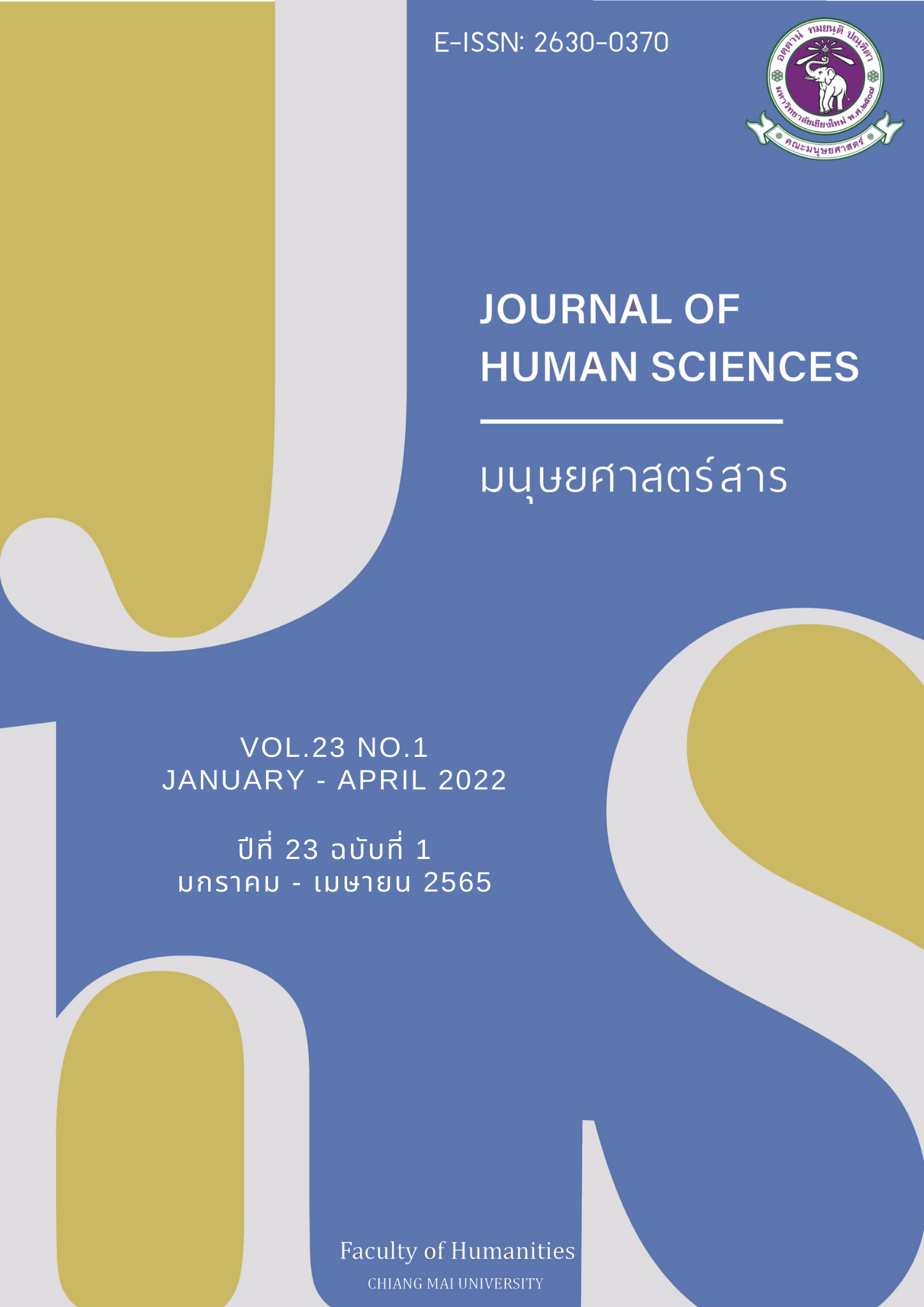การสำรวจภาวะพันธุ์ผสมขั้นพิเศษในวรรณกรรมแปลยุคหลังอาณานิคมในประเทศไทย
Main Article Content
บทคัดย่อ
บทความนี้มีจุดประสงค์เพื่ออธิบายพัฒนาการงานวิจัยเกี่ยวกับการแปลวรรณกรรมยุคหลังอาณานิยมในบริบทของไทยในช่วง 20 ปีที่ผ่านมา และสำรวจแนวคิดภาวะพันธุ์ผสมขั้นพิเศษในวรรณกรรมยุคหลังอาณานิคมที่ได้รับการแปลเป็นไทย โดยอาศัยกรอบแนวคิดการใช้ภาษาแบบขืนขนบและยึดภาษาของ Ashcroft et al (2003) ผลการวิจัยพบว่า งานวิจัยเกี่ยวกับการแปลวรรณกรรมยุคหลังอาณานิคมแบ่งได้ 2 กลุ่ม คือ (1) การศึกษากลวิธีการแปล และ (2) ศึกษาเปรียบเทียบต้นฉบับกับบทแปล ทั้งสองกลุ่มเริ่มนำแนวคิดยุคหลังอาณานิคมมาอธิบายการแปลอย่างจริงจังนับตั้งแต่ พ.ศ. 2558 นอกจากนั้นยังพบว่า ผู้แปลวรรณกรรมยุคหลังอาณานิคมที่คัดสรรเป็นภาษาไทย รักษาคำท้องถิ่นอันเป็นลักษณะเฉพาะของต้นฉบับไว้ (1) ด้วยการทับศัพท์หรือถอดเสียงตรงตามตัวอักขระโรมัน (2) ด้วยการทับศัพท์ตามวิธีเขียนคำสันสกฤตในระบบการเขียนไทย และ (3) ด้วยการใช้เชิงอรรถ ซึ่งสะท้อนภาวะพันธุ์ผสมขั้นพิเศษในระดับหนึ่ง แต่ในบางกรณี ผู้แปลเลือกที่จะไม่แปลคำท้องถิ่นและไม่สามารถแก้ปัญหาการปนกันของโครงสร้างไวยากรณ์ระหว่างอังกฤษกับภาษาท้องถิ่นได้ ทำให้เจตนาในการแสดงความเป็นท้องถิ่นหายไป
Article Details

อนุญาตภายใต้เงื่อนไข Creative Commons Attribution-NonCommercial-NoDerivatives 4.0 International License.
เอกสารอ้างอิง
Appiah, K. A. (1993/2012). Thick translation. In L. Venuti (Ed.), The Translation Studies readers (3rd ed., pp. 331-343). London: Routledge.
Ashcroft, B., Griffiths, G., & Tiffin, H. (2003). The Empire writes back: theory and practice in post-colonial literature (2nd ed.). London: Routledge.
Ashcroft, B., Griffiths, G. & Tiffin, H. (2009). Post-colonial studies: the key concepts (2nd ed.). Abingdon, Oxon: Routledge.
Bandia, P.F. (2008). Translation as Reparation: Writing and Translation in Postcolonial Africa. Routledge.
Bassnett, S. (2014). Postcolonial translation. In S. Chew & D. Richards (Eds.), A concise companion to postcolonial literature (pp. 79-95). Malden, MA: Wiley-Blackwell.
Bassnett, S. & Trivedi, H. (Eds.). (1999). Post-colonial translation: Theory and practice. London: Routledge.
Bertacco, S. (2013). The ‘gift’ of translation to postcolonial literatures. In S. Bertacco (Ed.), Language and translation in postcolonial literatures: Multilingual contexts, translational texts (pp. 136-167). London: Routledge.
Bhabha, H. K. (1994). The location of culture. London: Routledge.
Chittiphalangsri, P. (2014). On the virtuality of translation in Orientalism. In Translation Studies, 7(1), 50-65. DOI: 10.1080/14781700.2013.843356
Chittiphalangsri, P., & Techawongstien, K. (2019, August 31). One Siam: the politics of singularity and the landscape of translation in Thai language policies [Conference presentation]. The Eighth IATIS Regional Workshop “Of Peninsula and Archipelago: the landscape of translation in Southeast Asia, Chalermprakiat Center of Translation and Interpretation, Chulalongkorn University, Thailand.
Emory University. (2014, February 25). India Summit: Salman Rushdie on Contemporary Literature in India [Interview video]. Retrieved February 10, 2021 from https://www.youtube.com/watch?v=8NAJ30XjaXI
Harrison, R.V., & Jackson, P.A. (Eds.). (2010). The ambiguous allure of the west: traces of the colonial in Thailand. Hong Kong University Press.
Hermans, T. (2003). Cross-cultural translation studies as thick translation. Bulletin of the School of Oriental and African Studies, 66(3), 380-389.
Hermans, T. (2007). The conference of the tongues. Manchester, UK: St. Jerome.
Herzfeld, H. (2017). Thailand in a larger universe: The lingering consequences of crypto-colonialism. The Journal of Asian Studies, 76(4), 887–906. https://doi.org/10.1017/S0021911817000894
MacLeod, C. (1997). Black American literature and the postcolonial debate. The Yearbook of English Studies, 27, 51-65. https://doi.org/10.2307/3509132
Munday, J. (Ed.). (2007). Translation as Intervention. London: Continuum.
Niranjana, T. (1992). Siting translation: History, post-structuralism, and the colonial context. Los Angeles: University of California Press.
Phanthaphoommee, N. (2015). Kan plæ phawa phan phasom nai nawaniyai rưang the Moor’s Last Sigh kho̜ng Sulman Rushdie [A translation of hybridity in The Moor's Last Sigh by Salman Rushdie] (Unpublished master’s thesis, Chulalongkorn University).
Rafael, V.L. (2016). Motherless tongues: The insurgency of language amid wars of translation. Duke University Press.
Robinson, D. (1997). Translation and empire: Postcolonial theories explained. London: Routledge.
Spivak, G.C. (1993/2012). The Politics of Translation. In L. Venuti (Ed.), The Translation Studies reader (3rd ed., pp. 312-330). London. New York: Routledge.
Toury, G. (1995/2012). The nature and role of norms in translation. In L. Venuti (Ed.), The Translation Studies readers (3rd ed., pp. 168-182.) London: Routledge.
Venuti, L. (1995). The translator’s invisibility: A history of translation. New York: Routledge.
วรรณกรรมและบทแปลที่ศึกษา
Ghosh, A. (2001). The glass palace. London: The Borough Press.
Ghosh, A. (2018). Raoran nai wanwan [Yesterday’s regret] (or the glass palace) (T. Jiraratanapairoj, Trans.). Bangkok: Matichon.
Roy, A. (2017). The ministry of utmost happiness. London: Penguin Books.
Roy, A. (2020). Krasuang suk sutsut [The ministry of utmost happiness] (Sotsai, Trans.). Bangkok: Matichon.
Rushdie, S. (1995). Midnight’s children. New York: Alfred A. Knopf.
Rushdie, S. (2010). Tharok thiangkhưn [Midnight’s children] (N. Wetsawat, Trans.). Bangkok: Pearl Publishing.
Rushdie, S. (2020). Midnight’s children (S.W. Bell, Trans.). Bangkok: Matichon.


